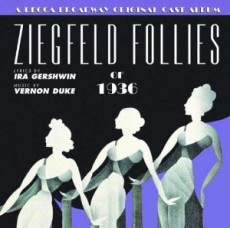
From Broadway To 52nd Street
The Ziegfeld Follies of 1936 premiered on Broadway at the Winter Garden Theatre on January 30, 1936 and closed on May 9, 1936 after 115 performances due to Fanny Brice’s illness. The musical had a return engagement on Broadway at the Winter Garden Theatre on September 14, 1936, and closed on December 19, 1936 after 112 performances. Brice reprised her role, with the additional cast that included Gypsy Rose Lee.
The musical was produced by Billie Burke Ziegfeld, Lee Shubert and J. J. Shubert; directed by John Murray Anderson and Edward Clarke Lilley; choreographed by Robert Alton; sketches directed by Edward D. Dowling; ballets directed by George Balanchine and scenic design and costumes were by Vincente Minnelli.
Vernon Duke composed the music with lyrics by Ira Gershwin and a cast starring Fanny Brice, Bob Hope, Eve Arden, Josephine Baker and the Nicholas Brothers.
The Story: In the opening number Brice mocks her famous song (“My Man”) in “He Hasn’t a Thing Except Me”, standing against a lamp-post. In “The Sweepstakes Taker” Brice portrays a Jewish Bronx housewife who wins the Irish sweepstakes. In “Fancy Free’ she becomes the affected and bored British “Zuleika” as she exchanges witty remarks with her husband Sir Robert, and, leaving behind elegance, burps in his face and utters a trade-mark “Denk you.” As Baby Snooks, Brice stars with popular stars of the day such as Clark Gable. The only song to become popular from the musical was “I Can’t Get Started” sung by Bob Hope to Eve Arden.
Broadway History: The musical was not all that was spawned from within the hallowed walls of the Broadway theatre. A new age of American playwright with the emergence of Eugene O’Neill, whose successful plays such as Beyond the Horizon, Anna Christie and The Hairy Ape proved that there was an audience for serious drama on Broadway, thus ushering major dramatists like Elmer Rice, Maxwell Anderson, Robert E. Sherwood, Tennessee Williams and Arthur Miller. Comedy and classical revivals became the norm on Broadway and opened the doors for dramas addressing the rise of Nazism and America’s non-intervention in the approaching world war. The most successful was Lillian Hellman’s “Watch on the Rhine” that would open in April 1941.

